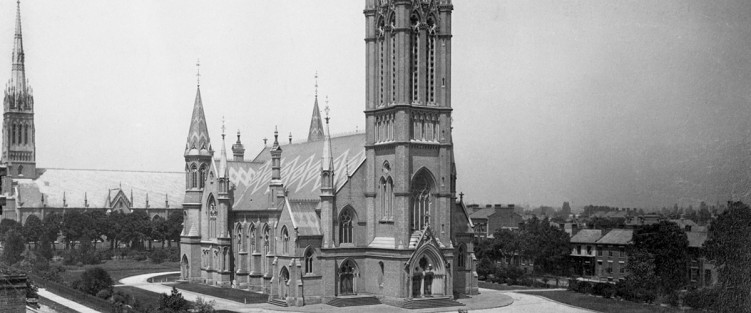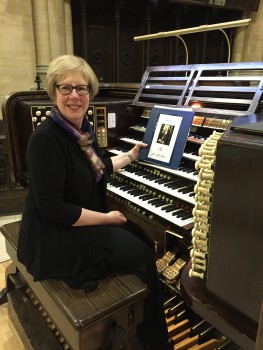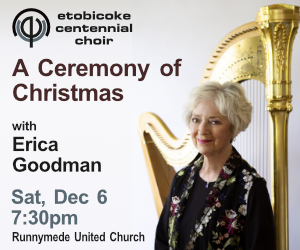 Metropolitan United Church is one of Toronto’s most musical places of worship. Founded two centuries ago in 1818, the Methodist congregation grew so rapidly that by 1872 a new, imperiously gothic church was built, seating 1800 congregants with additional room for 300 choristers. Described as Canada’s “Methodist Cathedral” or “Mother Church of Methodism,” Toronto’s Metropolitan Wesleyan Methodist Church became Metropolitan United Church in 1925 after the unification of Methodists, Congregationalists and Presbyterians.
Metropolitan United Church is one of Toronto’s most musical places of worship. Founded two centuries ago in 1818, the Methodist congregation grew so rapidly that by 1872 a new, imperiously gothic church was built, seating 1800 congregants with additional room for 300 choristers. Described as Canada’s “Methodist Cathedral” or “Mother Church of Methodism,” Toronto’s Metropolitan Wesleyan Methodist Church became Metropolitan United Church in 1925 after the unification of Methodists, Congregationalists and Presbyterians.
Unfortunately, this newly dedicated church was all but destroyed by fire in 1928, replaced by the current Metropolitan United Church building in December 1929. Featuring Canada’s largest pipe organ with over 7,200 pipes (increased to 8,200 in 1998), Metropolitan developed many of the musical programs for which it is now famous – the Silver Band, the concert series and the outstanding choirs – during the 1930s and 1940s.
Metropolitan United Church’s tradition of musical excellence continues to this day, evolving and increasing its outreach over the decades, most recently under the guidance of Minister of Music Patricia Wright. Under Dr. Wright, the Music at Metropolitan program has expanded to include the Wayne C. Vance Organ Scholar program and the annual Jim and Marg Norquay concert, this year featuring Rezonance, Metropolitan’s newly-minted ensemble-in-residence, in their presentation of the “Mystery of the Unfinished Concerto.” (For those who find the classics a bit stuffy, this coming May Music at Metropolitan also presents “Showtunes for 200,” a multimedia concert of standards from operetta and musical theatre.)
Along with these newer initiatives are the older, more traditional presentations, including a weekly organ recital series (on a temporary hiatus due to renovation) and Met’s famous Good Friday choir and orchestra concerts. Both these weekly organ recitals and large choral concerts are Metropolitan traditions, each started in the 19th century and continuing unbroken to the present day, with significant improvements in quality and programming; for example, this year’s Good Friday concert features Bach’s magnificent Mass in B Minor.
In anticipation of this concert and in celebration of Metropolitan’s bicentennial, we asked Dr. Wright to share her thoughts on Music at Metropolitan’s past, present and future.
WN: Metropolitan United is a historic church with a historic music program. Tell us about the history of music at Met, especially related to the development of what is now Music at Metropolitan, a freestanding concert series.
PW: Metropolitan has always regarded music as a ministry. In 2004 I was covenanted as the first congregationally-dedicated minister of music within the United Church of Canada, the first denomination to officially regard music as a ministry.
There is a long tradition of midweek concerts as well as a concert series, which is not new; Frederick Torrington [director of music 1873-1907] had a series of Thanksgiving Day concerts, presenting choir and orchestra performances. S. Drummond Wolff led what was probably the first [Metropolitan] performance of the St. Matthew Passion in 1946, and in 1964 Paul Murray led the Brahms Requiem on Passion [Palm] Sunday. Melville Cook [director of music 1967-1986] expanded the concerts, eventually giving three concerts a year with orchestra, and started performing the St. Matthew Passion each year on Good Friday.
[In 1987] I inherited this tradition of a Festival Choir concert on Good Friday and we have performed a variety of repertoire since, including Bach’s St. John Passion [eight times], Mass in B Minor [four times], Brahms Requiem, and large choral works by Duruflé, Fauré, Chilcott and Rutter, among others. This is my 32nd Good Friday concert and there are some singers in the choir who have been involved in these Festival Choir performances longer than I have!
Met turns 200 this year and selecting the music for such an important season likely required much thought and consideration. Why did you choose the Mass in B Minor for this year’s Festival Choir performance?
The Mass in B Minor is the biggest choral and orchestra work we perform. To me, [the Mass in B Minor] is the summation of Bach’s work. It is, from my perspective as an organist, conductor and Bach lover, the greatest piece in choral literature, if not all of music. The way Bach put it together, combining music that he took from other cantatas with newly composed material … and he never heard it performed in his lifetime!
Last June [my husband and I] were at the Leipzig Bach Festival and the last concert of the week was the Mass in B Minor. We’re in the Thomaskirche, sitting in the chancel with Bach’s grave plate in front of us, hearing the Mass in B Minor – that is a lifetime experience, so touching and moving, I can’t describe it.
Beyond the traditional Good Friday concerts, the Music at Metropolitan series has grown considerably over the past few years. Now that it incorporates a variety of sacred and secular presentations, what role do you see Music at Metropolitan taking in Toronto’s musical landscape?
We started experimenting with a variety of programs – choral and brass concerts at Christmas, for example – then we branched out into vocal recitals. This wasn’t a new idea; vocal concerts were happening at Met during Melville Cook’s time. In the 1970s there were summer concerts in the park [in front of Metropolitan, on Queen Street], so [Music at Metropolitan] is a combination of past and present. We’ve presented all kinds of concerts under the Music at Metropolitan label, including concerts by our own singers, guest singers and performers, leading organ recitalists, and for the first time, our own ensemble-in-residence, Rezonance Baroque Ensemble. They gave a concert last fall, are giving another in April [the Mystery of the Unfinished Concerto on April 22], and we also give lighter shows [such as Showtunes for 200]. We’ve branched out into all kinds of concerts!
We want Metropolitan to be known as a place where people from any or no faith tradition can come and be touched by music, because music transcends traditions. Metropolitan, in all areas of its ministry, is a place where people can come and be comforted: spiritual comfort through music; physical comfort through our downtown outreach programs. I inherited one of Toronto’s important and historic musical traditions and I am honoured to be a steward of that tradition into the future. Metropolitan has always regarded music as ministry and outreach and I hope that’s what Metropolitan continues to represent to this community in the future.
Matthew Whitfield is a Toronto-based harpsichordist and organist.




